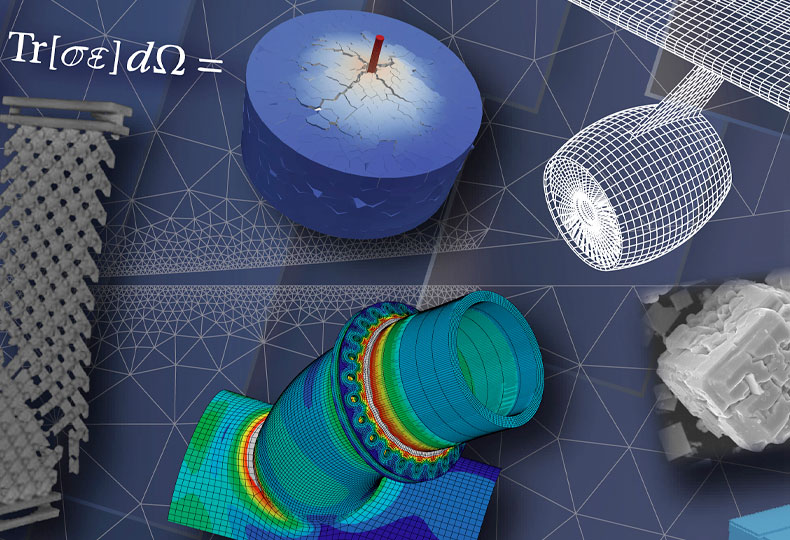The LMPS, a laboratory at the forefront of innovation for a sustainable future

Societal issues and technological innovation
The LMPS is structured around five major challenges: sustainable development, risk management, transport, health, and data science and artificial intelligence. These themes are at the heart of the research carried out by its teams, who draw on cutting-edge skills in modeling, experimentation and digital simulation.
For example, to reduce the carbon footprint of construction materials, Labcom MC²E (Eco-Efficient Cement Materials), in partnership with ECOCEM, is developing eco-materials, including a low-carbon cement that reduces CO2 emissions by 80% compared with traditional cements. These innovations aim to improve the sustainability of construction while reducing the energy requirements of the civil engineering sector.
In addition, the LMPS is contributing to the digital transition through the use of data to optimally design and operate systems. The use of digital twins makes it possible to anticipate structural failures and better manage environmental risks. A typical example of this research is the ERC DREAM-ON project, which focuses on the design of intelligent autonomous mechanical structures, capable of performing on-line health checks and taking anticipatory action during service before critical events occur.
New lines of research
The LMPS explores advanced technologies, notably through in-situ testing at different scales, intensive use of imaging, computational mechanics and artificial intelligence. These tools enable us to accurately model the behavior of materials and structures under extreme conditions, providing more reliable simulations and more accurate predictions. The laboratory is fully involved in 4 of the 6 challenges of the next CNRS contract for objectives, resources and performance: Limitless Instrumentation, Generative AI for Science, Materials of the Future and Societies in Transition.
The laboratory is structured into four major research teams covering a variety of fields such as materials behavior, architected media, advanced numerical mechanics, vulnerabilitý of constructions... These teams develop innovative methods to meet the needs of industrial sectors, particularly in experimentation, multi-scale modeling and simulation and high-performance numerical methods.
Collaborations and strategic partnerships
The LMPS has developed numerous partnerships with major industrial players such as SAFRAN, Michelin, EDF, ECOCEM and SNCF, as well as with international academic institutions. Among these collaborations, the IRTG CoMeTeNd with the Leibniz University of Hanover is particularly noteworthy. This partnership, dedicated to high-dimensional computational mechanics techniques, strengthens LMPS capabilities in advanced numerical modeling and optimization of materials and structures under extreme conditions.
These international academic collaborations (36 nationalities are represented within LMPS), strengthen the scope of LMPS research and promote the emergence of technological solutions adapted to the global challenges of climate change and sustainable development.
Key scientific results
The LMPS has made significant scientific advances, notably in model reduction techniques, experimental mechanics (particularly multi-axial aspects, hybrid control, and multi-modal in situ 2D-3D-4D field measurement), materials damage, instability and fracture modeling, earthquake engineering, and improving the robustness of infrastructures in the face of natural hazards. This work is helping to improve the predictability and durability of materials used in various industrial sectors, from construction to aeronautics.
The MINERVE project, developed in collaboration with SNCF and RATP, and the ANR Industrial HEAT COFFEE Chair in collaboration with RTE illustrate LMPS's commitment to adapting infrastructures to the challenges of climate change, while aiming for carbon neutrality. While MINERVE aims to achieve carbon neutrality in the rail infrastructure sector while adapting these infrastructures to climate change, HEAT COFFEE tackles the issue of the sustainability of electrical infrastructures and their environmental impact.
A sustainable future
Thanks to its capacity for innovation, the LMPS is positioned as a key player in mechanical engineering research, supported by solid collaborations and ambitious projects. Its research meets the challenges of sustainable development, while exploring new technologies to optimize energy efficiency and extend the lifespan of infrastructures. Together with its industrial and academic partners, LMPS is actively contributing to building a more sustainable and resilient future.
Laboratory partners
SNCF, THALES, CETIM, RENAULT, SAFRAN, EXAIL, CEA, CNES, AIRBUS, DGA, SIEMENS, ONERA, RTE, IRSN, IREX, EIFFAGE, ECOCEM, MBDA,VINCI, MICHELIN, ISL, CETU, ANDRA, STELLANTIS, CERIB, BOUYGUES, NAFEMS, SIXENSE, EIKOSIM, DASSAULT AVIATION, GE HEALTHCARE, AIR LIQUIDE, EDF, SAINT-GOBAIN, CEMENTYS…
